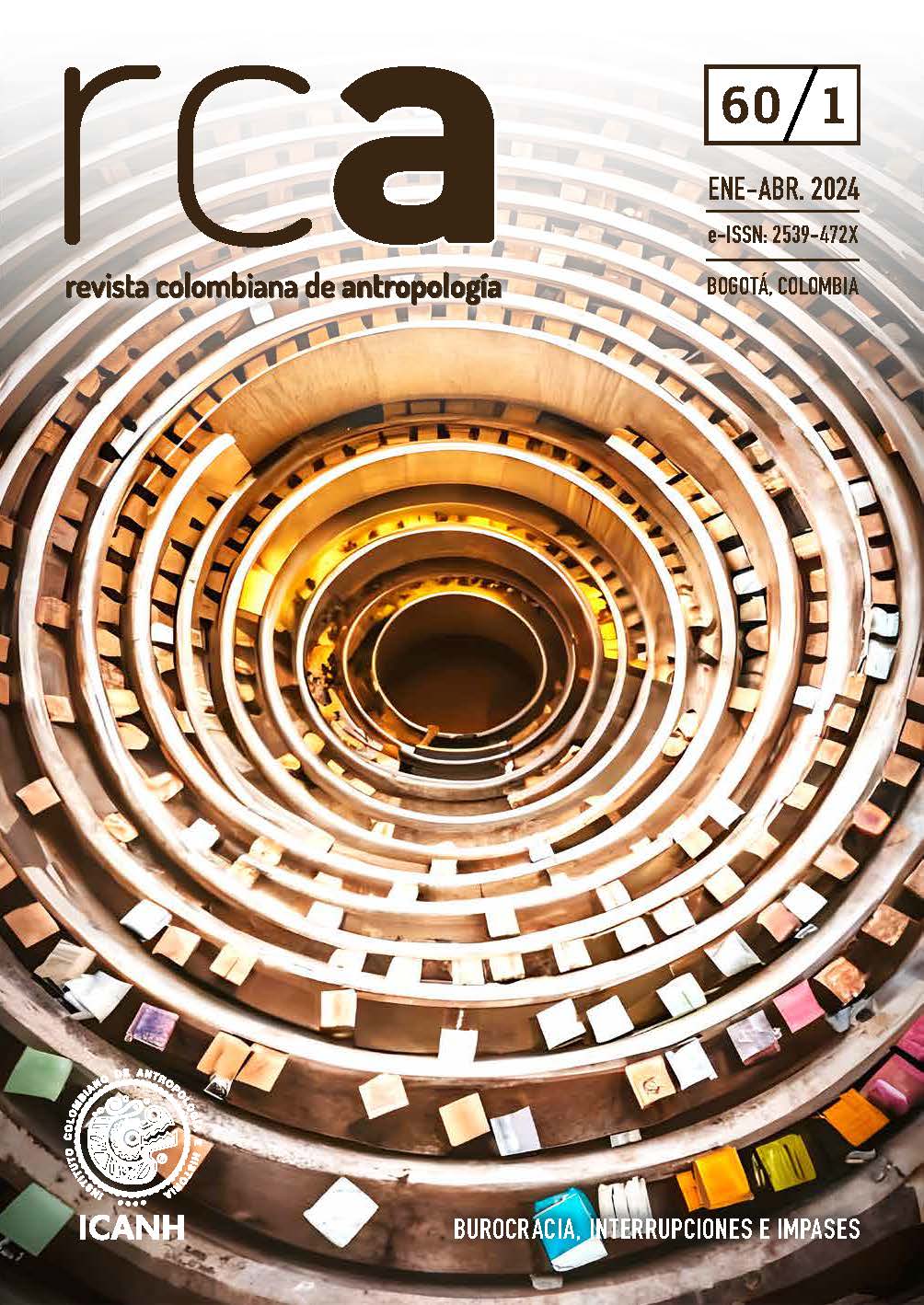Bureaucractic (De/con)textualizations. Tensions around Interactions and Documentary Practices in Mexico City’s Transportation Bureaucracy
DOI:
https://doi.org/10.22380/2539472X.2590Keywords:
bureaucracy; documentary practices or documents; transparency; corruption; bureaucratic interactions.Abstract
Based on fieldwork in Mexico City's Ministry of Mobility, this article analyzes the link between the interactions and negotiations that transport bureaucrats hold with different actors, such as public transport concessionaires, on the one hand, and the documentary practices aimed at recording what happens in those meetings, on the other. We argue that the writing of various documentary artifacts-circulars, official letters, minutes of meetings-is linked to the mandates of transparency and the fight against corruption. To translate what happened in face-to-face interactions into written documents that become auditable testimonies, bureaucrats employ various discursive strategies such as impersonality, obliteration of the details of negotiations, and paralinguistic signs. These strategies are aimed at cleaning up the context and, at the same time, complying with the bureaucratic formalities of the documentary record.
Downloads
References
Ayers, Alison J. 2008. “‘We All Know a Democracy When We See One’: (Neo)Liberal Orthodoxy in the ‘Democratisation’ and ‘Good Governance’ Project”. Policy and Society 27 (1): 1-13. https://doi.org/10.1016/j.polsoc.2008.07.001
Azuela de la Cueva, Antonio, ed. 2007. Las compras del Gobierno: datos blandos, percepciones duras. Ciudad de México: UNAM, Instituto de Investigaciones Sociales.
Bakthin, Mikhail M. 1981. The Dialogic Imagination. Austin: University of Texas Press.
Benveniste, Émile. 1979. Problemas de lingüística general. Ciudad de México: Siglo Veintiuno.
Bourdieu, Pierre. 1991. Language and Symbolic Power. Cambridge: Polity.
Brenneis, Don. 2006. “Reforming Promise”. En Documents: Artifacts of Modern Knowledge, editado por Annelise Riles, 41-70. Ann Arbor: The University of Michigan Press.
Cavanaugh, Jillian R. 2016. “Documenting Subjects: Performativity and Audit Culture in Food Production in Northern Italy”. American Ethnologist 43 (4): 691-703. https://doi.org/10.1111/amet.12384
De la Peña, Guillermo. 1980. Herederos de promesas: agricultura, política y ritual en los Altos de Morelos. Ciudad de México: Ciesas.
Derrida, Jacques. 1982. “Signature Event Context”. En Margins of Philosophy, traducido por Alan Bass, 309-330. Chicago: The University of Chicago Press.
Dery, David. 1998. “‘Papereality’ and Learning in Bureaucratic Organizations”. Administration and Society 29 (6): 677-689. https://doi.org/10.1177/009539979802900608
Feldman, Ilana. 2008. Governing Gaza: Bureaucracy, Authority, and the Work of Rule, 1917-1967. Durham: Duke University Press.
Gumperz, John J. 1992. “Contextualization and Understanding”. En Rethinking Context: Language as an Interactive Phenomenon, editado por Alessandro Duranti y Charles Goodwin, 229-252. Nueva York: Cambridge University Press.
Gupta, Akhil. 2012. Red Tape: Bureaucracy, Structural Violence, and Poverty in India. Durham: Duke University Press.
Hansen, Thomas Blom y Finn Stepputat. 2001. “Introduction: States of Imagination”. En States of Imagination: Ethnographic Explorations of the Postcolonial State, editado por Thomas Blom Hansen y Finn Stepputat, 1-37. Durham: Duke University Press.
Herzfeld, Michael. 1992. The Social Production of Indifference: Exploring the Symbolic Roots of Western Bureaucracy. Chicago: The University of Chicago Press.
Hetherington, Kregg. 2011. Guerrilla Auditors: The Politics of Transparency in Neoliberal Paraguay. Durham: Duke University Press.
Hibou, Béatrice. 2015. The Bureaucratization of the World in the Neoliberal Era: An International and Comparative Perspective. Nueva York: Palgrave Macmillan.
Hull, Matthew S. 2012. Government of Paper: The Materiality of Bureaucracy in Urban Pakistan. Berkeley: University of California Press.
Latour, Bruno y Steve Woolgar. 1986. Laboratory Life: The Construction of Scientific Facts. Princeton: Princeton University Press.
Leal Martínez, Alejandra, Verónica Crossa y Arturo Díaz. (En prensa). Hacer bien las reglas: técnica y política en la burocracia de la movilidad en la Ciudad de México. Ciudad de México: Colegio de México, Centro de Investigaciones Interdisciplinarias en Ciencias y Humanidades.
Lomnitz, Claudio, coord. 2000. Vicios públicos, virtudes privadas: la corrupción en México. Ciudad de México: Ciesas; Porrúa.
Nuijten, Monique. 2003. Power, Community, and the State: The Political Anthropology of Organization in Mexico. Londres: Pluto Press.
Osborne, Thomas. 1994. “Bureaucracy as a Vocation: Governmentality and Administration in Nineteenth-Century Britain”. Journal of Historical Sociology 7 (3): 289-313. https://doi.org/10.1111/j.1467-6443.1994.tb00067.x
Riles, Annelise, ed. 2006. Documents: Artifacts of Modern Knowledge. Ann Arbor: The University of Michigan Press.
Sosa López, Oscar y Sergio Montero. 2018. “Expert-Citizens: Producing and Contesting Sustainable Mobility Policy in Mexican Cities”. Journal of Transport Geography 67: 137-144. https://doi.org/10.1016/j.jtrangeo.2017.08.018
Strathern, Marilyn, ed. 2000. Audit Cultures: Anthropological Studies in Accountability, Ethics and the Academy. Londres: Routledge.
Tidey, Silvia. 2016. “Between the Ethical and the Right Thing: How (Not) to Be Corrupt in Indonesian Bureaucracy in an Age of Good Governance”. American Ethnologist 43 (4): 663-676. https://doi.org/10.1111/amet.12382
Downloads
Published
How to Cite
Issue
Section
License

This work is licensed under a Creative Commons Attribution-NonCommercial-NoDerivatives 4.0 International License.




















